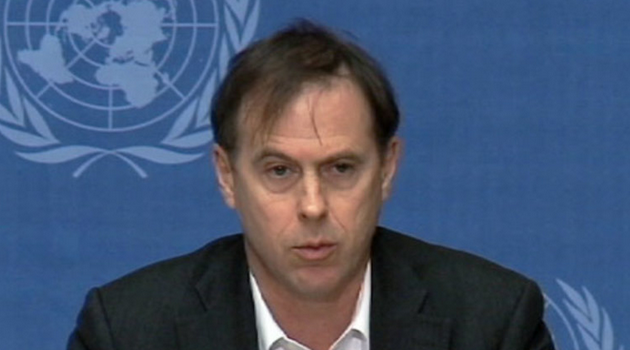Amid ongoing conflict in and around the capital, OHCHR spokesperson Rupert Colville (pictured) expressed deep concern about the “ghastly conditions” in which migrants and refugees are being detained in the capital Tripoli and elsewhere.
He explained that at the Zintan facility south of Tripoli, 22 people had died of tuberculosis - which is preventable - and other illnesses since last September.
“Tuberculosis need not be a killer disease, but in these circumstances, clearly it is killing people and there must be a risk that more will die”, Mr. Colville said. “There’s another report that people are being sent to a different place near the front line effectively to die there, because they are Christians, and there are no burial facilities near Zintan.”
The development follows clashes in and around the outskirts of Tripoli, instigated by the self-styled Libyan National Army forces of General Khalifa Haftar, who leads a parallel administration in the eastern city of Benghazi.
Insisting that conditions at Zintan may amount to “inhuman and degrading treatment or punishment” and possibly torture, the OHCHR spokesperson expressed concern that other migrants have been sold into forced labour or to smugglers offering transit to Europe.
“We are also extremely concerned about ongoing reports of disappearances and human trafficking after people were intercepted at sea by the Libyan Coast Guard and taken back to Libya,” he said, in an appeal to the Government of National Accord to launch an investigation to locate those missing.
“The Libyan Coast Guard and the DCIM (Department for Combatting Illegal Migration) must ensure that they are accountable for every person held in detention, and that their human rights are respected”, Mr. Colville said. “We remind the Government that when a person dies in custody, there is a presumption of State responsibility…TB is clearly really a menacing threat in Zintan and it needs proper attention…proper medical care; and this is really a crisis.”
More than 2,300 people have been picked up in the Mediterranean Sea since 30 April and put in detention facilities, Mr. Colville noted, adding that the Libyan Coast Guard reported that it had delivered “hundreds” to a facility in Al-Khoms, which is under the oversight of the UN-recognized Government’s Department for Combatting Illegal Migration, or DCIM.
Of this number, more than 200 were delivered there on 23 May, but the Al-Khoms facility reported that it now has “only 30 migrants present, despite 203 been taken there just a couple of weeks ago”, he said.
In addition, Mr. Colville highlighted reports that some women have been sold for sexual exploitation – the latest in a long list of “horrific abuses to which migrants and refugees are subjected” in the troubled North African State.
Today, some 3,400 migrants and refugees are detained in Tripoli, according to OHCHR. “Libya has a heightened duty of care to protect the lives of individuals deprived of their liberty, including providing them with the necessary medical care,” Mr. Colville said.
(Source: UN)





